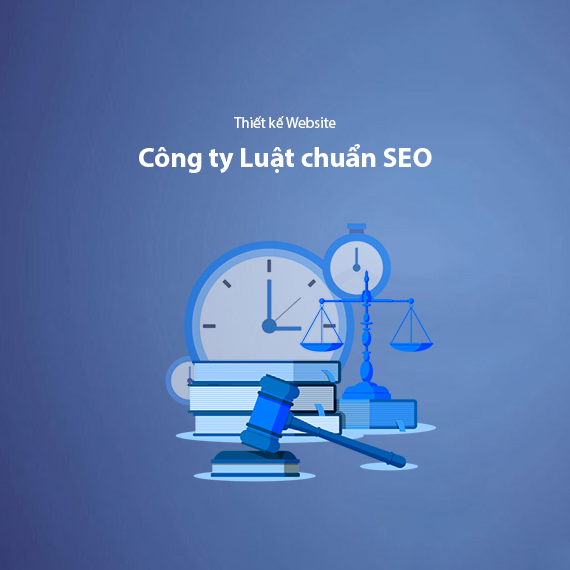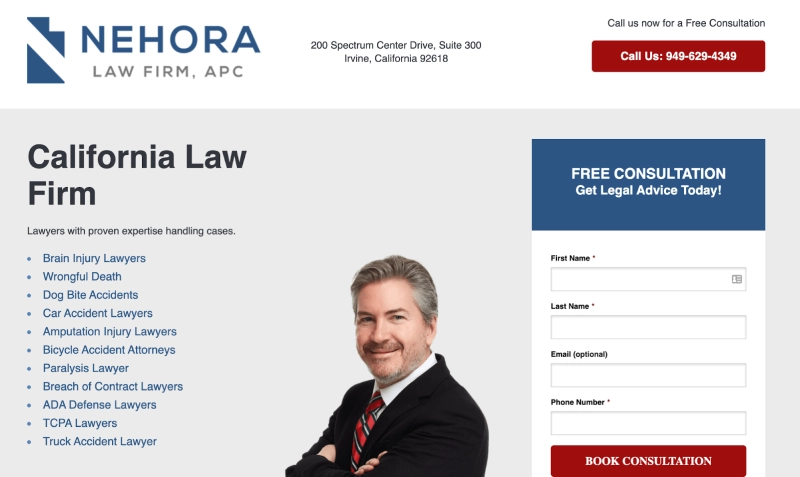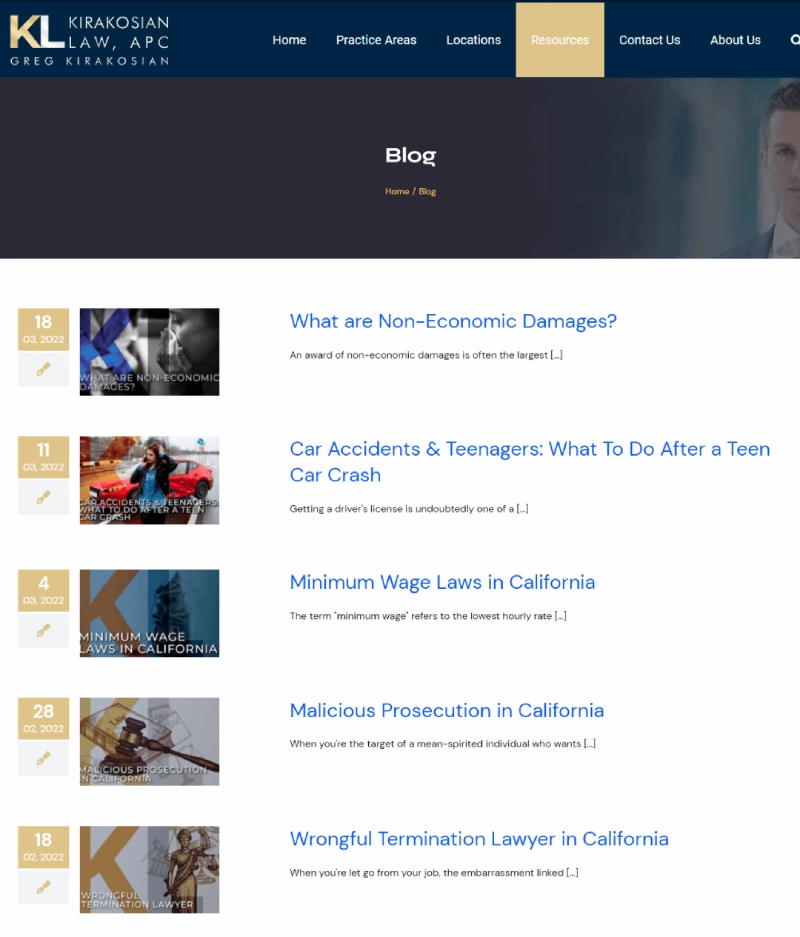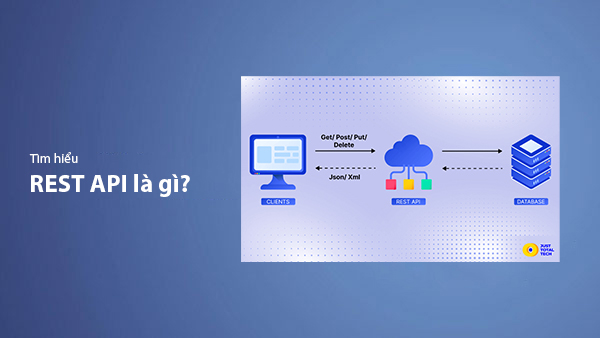Law Office Website Design - Effective SEO-Optimized Law Firm Websites
- Published on

- Why Do Law Firms Need an SEO-Optimized Website?
- Features of an SEO-Optimized Law Firm Website
- Professional and Serious Interface
- High-Quality, SEO-Optimized Content
- Integrated Functional Features
- Optimized Page Load Speed
- Benefits of an SEO-Optimized Website for Law Firms
- Increase Brand Awareness
- Attract the Right Target Audience
- Improve Legal Consultation Efficiency
- Enhance SEO Rankings and Increase Traffic
- Support Service Purchase Decisions
- Key SEO Factors for Law Firm Website Design
- Keywords
- Quality Content
- Technical Optimization (Technical SEO)
- Internal Links and Backlinks
- User Experience (UX/UI)
- Professional Law Firm Website Design Process
- Understand Business Needs and Goals
- Draft Website Interface and Structure
- Develop and Integrate Features
- Optimize SEO From the Outset
- Testing and Launch
- Handover and Usage Training
- Maintenance and Periodic Updates
- Sample SEO-Optimized Law Firm Websites
- Service-Oriented Websites
- Websites with Integrated Online Consultation
- Legal Blog Websites
- Multi-Functional Websites
- Common Mistakes to Avoid When Designing a Law Firm Website
- Unclear or Unattractive Content
- Poor Mobile Optimization
- Slow Page Load Speed
- Lack of Clear Security Policies
- Missing Essential Features
- Lack of Internal Linking
- Reliable Law Firm Website Design Providers
- Criteria for Choosing a Law Firm Website Design Provider
- Law Firm Website Design Services by RiverLee
In the digital age, a website is not just the online face of a business but also a crucial tool for attracting and retaining clients. Especially for law firms and legal consulting offices, owning an SEO-optimized website not only establishes a reputable brand but also serves as an essential bridge to reach thousands of potential clients daily.
A professional law firm website should not only provide information about legal services but also demonstrate transparency, reliability, and the ability to resolve legal issues effectively. With increasing competition in the industry, optimizing your website to achieve high rankings on Google is key to reaching your target audience.
Why Do Law Firms Need an SEO-Optimized Website?
- Increase brand awareness: A professional website with optimized interface and content helps clients remember the firm's name.
- Attract the right target audience: Appearing in search results for keywords like “reputable legal consulting services” or “professional litigation lawyers” increases the chance of connecting with potential clients.
- Improve user experience: Fast loading speed, user-friendly interfaces, and clear content not only retain clients but also make you stand out on Google.

Learn more: Why Businesses Need an SEO-Optimized Website to understand the strategic benefits.
Given these reasons, designing an SEO-optimized website is not just a necessity but also a strategic step to help law firms thrive in the market. SEO-ready content, professional interfaces, and modern technology integration are indispensable for building a successful website.
Features of an SEO-Optimized Law Firm Website
To create a law firm website that is not only aesthetically pleasing but also effective in attracting clients, focus on the following important features:
Professional and Serious Interface
The nature of the legal industry requires a website to exude credibility and professionalism at first glance. Minimalistic and sophisticated designs with neutral colors such as blue, white, or black are often used to convey trustworthiness.
- Optimized user experience (UX): The website should be easy to navigate, allowing clients to quickly find important information like services, contact details, or legal advice articles.
- Responsive Design: With over 60% of users accessing websites via mobile devices, optimizing interfaces for smartphones and tablets is crucial.

High-Quality, SEO-Optimized Content
Content determines whether clients stay on your website. Ensure all information is clearly, comprehensively, and understandably presented.
- Keyword targeting: Use terms like “reputable lawyers,” “legal consulting services,” or “corporate legal advice” naturally in articles, titles, and meta tags.
- Provide real value: Blog posts offering legal advice and answers to common legal questions are excellent for attracting users and improving SEO rankings.
- Content formatting: Use subheadings (H2, H3), bullet points, and illustrative images for accessibility.
Read more: Guide to Writing SEO-Optimized Content for Websites.
Integrated Functional Features
A modern law firm website not only provides information but also facilitates client interactions and service usage:
-
Consultation contact forms: Simple yet indispensable, allowing clients to leave their information conveniently.

-
Online appointment scheduling: Clients can book appointments directly with lawyers via the website.
-
Legal document library: Offering free resources (PDFs, videos) supports clients and enhances brand credibility.
-
Chatbots: Answer queries 24/7 and collect potential client information.
Optimized Page Load Speed
Page load speed directly affects user experience and SEO rankings. Google prioritizes websites with fast loading speeds, so you need to:
- Optimize images: Use JPEG or WebP formats and compress images before uploading.
- Choose high-quality hosting: Ensure smooth access speeds, especially for data-heavy websites.
- Minimize code: Compress CSS, JavaScript, and remove unnecessary code.
Learn more: How to Check Website Speed.
These features not only ensure your website operates effectively but also help boost client conversions, delivering tangible business value.
Benefits of an SEO-Optimized Website for Law Firms
An SEO-optimized website offers numerous benefits, not only in terms of image but also by directly supporting business growth for law firms. Below are the key advantages:
Increase Brand Awareness
A website is where a law firm introduces its image, mission, and team of lawyers. With professional design, quality content, and user-friendly features, the website will help the firm:
- Build trust with clients through in-depth legal articles.
- Stand out from competitors with optimized design and content.
Learn more: How to Build a Digital Brand Through Websites.
Attract the Right Target Audience
Potential clients often search for keywords like “divorce lawyer,” “corporate legal services” on Google. An SEO-optimized website will help you:
- Rank higher in search results, increasing the likelihood of clients finding you over competitors.
- Meet real client needs through quality content that addresses their issues.
Improve Legal Consultation Efficiency
A website goes beyond providing information by acting as a tool to support consultation services:
- Offer legal resources: Create a free resource library to provide clients with accessible information.
- Integrate online tools: Features like chatbots, contact forms, or appointment scheduling save processing time.
Enhance SEO Rankings and Increase Traffic
An SEO-optimized website that is technically and content-wise optimized will increase organic traffic. As a result:
- Reduce advertising costs: Clients find you through organic searches, reducing the need for paid advertising.
- Boost credibility: High-ranking websites appear more professional and trustworthy to clients.
Support Service Purchase Decisions
A well-optimized website not only provides information but also guides clients toward purchasing services through elements like:
- Call-to-Action (CTA): “Book a consultation now,” “Contact a lawyer” encourages clients to act immediately.

- Case Studies and Testimonials: Showcasing successful cases and client reviews builds trust.
In summary, owning an SEO-optimized website not only attracts clients but also creates a significant competitive advantage in the market. Investing in website design and optimization is a strategic way to elevate your brand and expand business opportunities.
Key SEO Factors for Law Firm Website Design
For maximum effectiveness, Search Engine Optimization (SEO) is essential. Below are the key factors to focus on to achieve high rankings on search engines and attract organic traffic.
Keywords
Keywords are the foundation of any SEO strategy. During website design, research and select keywords relevant to the legal industry and client search needs.
- Short-tail keywords: “Lawyer services,” “Legal consultation.”
- Long-tail keywords: “Corporate legal consulting in Hanoi,” “Law firm for quick divorce procedures.”
Distribute keywords naturally in critical positions like article titles, meta descriptions, and main content.
Learn more: [Guide to Keyword Research] for industries(/blog/keyword-research).
Quality Content
Content not only attracts readers but is also crucial for Google’s evaluation and ranking.
- Write legal blogs: Provide helpful information on topics like legal procedures, litigation, and contracts.
- Update regularly: Ensure content is fresh and aligns with legal changes.
- Use multimedia: Videos and infographics effectively increase dwell time.
Technical Optimization (Technical SEO)
Technical factors directly affect how Google indexes and ranks your website. Key techniques include:
- Page load speed: Reduce image size and use data compression technologies.
- User-friendly URLs: Example:
/services/corporate-legal-consultationinstead of/page?id=123. - Meta tags: Ensure titles and meta descriptions are compelling and contain primary keywords.
Internal Links and Backlinks
Internal linking helps users navigate easily and creates a clear structure for search engines.
- Internal links: Link to related pages like Corporate Legal Services or Contact Us for Online Consultation.
- High-quality backlinks: Build links from reputable legal websites or press articles.
User Experience (UX/UI)
Google prioritizes websites offering a great user experience. Key considerations include:
- Simple, user-friendly design: Clear and easy-to-navigate layout.
- Visible CTAs: Buttons like “Book a Consultation” and “Contact Now” should be prominent.
- Mobile-friendly design: Ensure the website displays and functions smoothly on all screens.

By optimizing all these factors, your website will not only rank higher but also become a powerful tool for increasing client traffic and enhancing reputation in the legal industry.
Professional Law Firm Website Design Process
To ensure an effective law firm website, the design process must be systematic and methodical. Here are the critical steps in creating a professional, SEO-optimized website:
Understand Business Needs and Goals
Before starting, clearly define the goals the website needs to achieve, such as:
- Enhancing brand recognition.
- Attracting potential clients seeking legal services.
- Optimizing online consultation processes.
This helps guide interface design, features, and content to align with the target audience.
Draft Website Interface and Structure
Based on identified needs, outline:
- User Interface (UI): Ensure a minimalist, professional interface with colors and fonts that evoke trust.
- Website structure: Key pages often include: Home, Services, Legal Blog, Contact, About Us.
Develop and Integrate Features
This step involves detailed design based on the drafted interface and structure:
- Build core features: Consultation forms, appointment booking, chatbot, document library.
- Ensure responsive design: Compatibility across desktop, tablet, and mobile.
Optimize SEO From the Outset
The website must be SEO-ready during development:
- Optimize page load speed.
- Use search-engine-friendly URLs.
- Integrate basic sitemaps and meta tags.
Testing and Launch
Before going live, thoroughly check:
- Performance: Ensure fast load times and no technical errors.
- Functionality: Test contact forms, chatbots, and CTAs.
- Multi-device compatibility: The website must display and operate seamlessly on all platforms.
Handover and Usage Training
After completion, the design team hands over the website and trains the company’s administrators on content updates and feature management.
Maintenance and Periodic Updates
A successful website requires regular maintenance to ensure smooth operation:
- Update new content (blogs, services, news).
- Upgrade features and security to meet evolving client and Google requirements.
Note: If you're unsure where to start, consider professional law firm website design services to get support from expert teams.
A systematic process not only ensures effective website operation but also creates a standout online presence for your law firm.
Sample SEO-Optimized Law Firm Websites
To give you a clearer idea of how to design an SEO-optimized law firm website, here are some notable examples that are highly relevant and suitable for the legal industry:
Service-Oriented Websites
This type of website focuses on highlighting the legal services the firm provides.
- Features:
- A simple yet professional interface, using neutral colors to convey trust.
- Key services displayed on the homepage with illustrative images and clear calls-to-action like “Learn More” or “Contact Now.”
- Best suited for: Small law firms or consulting offices specializing in specific areas such as real estate, corporate law, or family law.

Learn more: How to Build a Professional Service-Oriented Website
Websites with Integrated Online Consultation
These websites not only provide information but also allow clients to ask questions or receive online consultations directly.
- Features:
- 24/7 chatbot integration.
- Clear appointment booking forms where clients can easily select a consultation time.
- FAQ sections to address common queries.
- Best suited for: Law firms handling large volumes of consultation requests via their website.

Legal Blog Websites
Some law firms utilize their websites as platforms to provide legal knowledge to clients. This not only enhances credibility but also attracts organic traffic from Google.
- Features:
- Focused on sharing articles about legal topics such as: "Divorce Procedure Guide," "Key Points When Signing Employment Contracts."
- Well-structured, SEO-friendly blog posts with clear categorization.
- Internal links to related service pages.
- Best suited for: Firms aiming to establish expertise through content.

Multi-Functional Websites
This is a comprehensive website type that integrates everything from service introduction, online consultation, to legal knowledge sharing.
- Features:
- Modern interface with videos introducing the team or showcasing notable case studies.
- Intuitive display of services, pricing, and contact information.
- Multi-language support (ideal for firms with international clients).
- Best suited for: Large-scale law firms or those seeking strong digital expansion.
Referring to these examples helps you define a clearer direction for building a professional website that fits your business needs and target audience.
Common Mistakes to Avoid When Designing a Law Firm Website
While designing an SEO-optimized website brings many benefits, some common mistakes can reduce effectiveness or negatively impact user experience and rankings. Below are mistakes to avoid:
Unclear or Unattractive Content
A critical mistake is failing to provide complete or professional content. This can cause clients to lose trust and leave the website.
- Example: Service descriptions are too brief and do not detail the legal areas the firm specializes in.
- Solution: Invest in writing clear, professional content, and use keywords like “real estate legal services” or “commercial contract advice.”
Poor Mobile Optimization
Over 60% of users access websites via mobile devices. If the website is not mobile-friendly, you could lose a large portion of potential clients.
- Example: The website does not display correctly on smaller screens or loads slowly on mobile devices.
- Solution: Ensure responsive design and test the interface on various devices.
Slow Page Load Speed
Users often leave a website if it takes more than 3 seconds to load. Slow speeds affect both user experience and SEO negatively.
- Cause: Non-compressed images, low-quality hosting, or non-optimized code.
- Solution: Compress images, use CDN, and high-speed hosting.
Lack of Clear Security Policies
Law firm websites often handle sensitive client information. Without proper security measures, there’s a high risk of data loss or cyberattacks.
- Example: No SSL implementation or no clear privacy policy.
- Solution: Integrate SSL (HTTPS) and provide a clear security policy on the website.
Missing Essential Features
Some law firm websites lack important features like contact forms, support chatbots, or online appointment booking, making it harder for clients to interact.
- Example: Clients must call to book an appointment, which can be inconvenient.
- Solution: Integrate essential features to enhance connectivity and conversion.
Lack of Internal Linking
Failing to create internal links between pages makes it harder for users to find information and reduces SEO effectiveness.
- Example: The “Legal Consulting Services” page doesn’t link to related blogs or contact forms.
- Solution: Use internal linking to guide users to additional content.
Avoiding these mistakes will help your website operate more effectively, offering the best experience to clients while improving Google rankings. Regular checks and updates are essential to maintain website quality.
Reliable Law Firm Website Design Providers
Criteria for Choosing a Law Firm Website Design Provider
To ensure you choose the right design partner for your law firm, consider the following key criteria:
-
Experience in Legal Website Design
A professional provider must have practical experience in designing law firm websites, covering everything from interfaces to functionality. This ensures they understand the unique needs of the industry, such as client data security, professional design, and optimized contact features. -
Post-Completion Customer Support
A reliable provider won’t stop at delivery but will also support you after the project is completed. Services like website maintenance, system upgrades, and technical support are indispensable to ensure the website operates stably and at optimal performance.
Law Firm Website Design Services by RiverLee
When it comes to SEO-optimized law firm website design, RiverLee is a leading provider, delivering comprehensive and exceptional-quality solutions. We not only create visually appealing websites but also optimize them to enhance business efficiency for our clients.
What Makes RiverLee Stand Out?
-
SEO-Optimized Design, User-Friendly Interface
Every website designed by RiverLee adheres strictly to the latest SEO standards, helping you rank higher on search engines. At the same time, interfaces are optimized to leave a strong impression on clients from the first visit, thereby enhancing your firm’s credibility and brand. -
Modern Features and High Security
We integrate specialized features such as online legal consultation forms, intelligent chatbots, and customer information management systems. Security is a top priority, ensuring comprehensive protection for client and business data. -
Professional Workflow, Quality Assurance
With an experienced team, RiverLee follows a clear workflow: from requirement analysis, interface design, functionality programming to handover and usage training. We commit to delivering maximum satisfaction with high-quality products.
Why Choose RiverLee for Law Firm Website Design?
- Extensive Experience: Successfully completed multiple website design projects for major law firms and legal consulting offices.
- Comprehensive Services: From interface design, SEO optimization, to long-term website operation support.
- Reasonable Costs: Delivering high-quality services at competitive prices.
Contact RiverLee today to start your law firm website project, elevating your brand and creating sustainable competitive advantages!
Latest Posts

Lesson 26. How to Use break, continue, and return in Java | Learn Java Basics
A guide on how to use break, continue, and return statements in Java to control loops and program execution flow effectively.

Lesson 25. The do-while Loop in Java | Learn Basic Java
A detailed guide on the do-while loop in Java, including syntax, usage, examples, and comparison with the while loop.

Lesson 24. How to Convert Decimal to Binary in Java | Learn Basic Java
A guide on how to convert numbers from the decimal system to the binary system in Java using different methods, with illustrative examples.

Lesson 23. How to Use the While Loop in Java | Learn Java Basics
Learn how to use the while loop in Java with syntax, real-world examples, and practical applications in Java programming.
Related Posts

What is REST API? Complete A-Z Knowledge About REST API
REST API is one of the essential concepts that every backend developer needs to fully understand. This article provides comprehensive knowledge about REST API, including its definition, principles of operation, and how to build a standard RESTful API.

What is HATEOAS? How to Build APIs Using HATEOAS
Learn about HATEOAS, an important concept in API development, and how to build APIs using HATEOAS to improve interactivity and scalability.

What Is GraphQL? The Advantages of GraphQL Over REST API
Explore GraphQL, a modern API technology, and why it outperforms REST API in many web development scenarios.

What is XSS? Signs of Detection and Effective Prevention Methods
Learn about XSS, signs of detection, and effective prevention methods for XSS attacks in websites.

